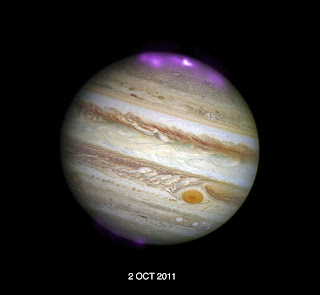Solar storms are triggering X-ray auroras on Jupiter that are about eight times brighter than normal over a large area of the planet and hundreds of times more energetic than Earth’s "northern lights," according to a new study using data from NASA’s Chandra X-ray Observatory. This result is the first time that Jupiter's auroras have been studied in X-ray light when a giant solar storm arrived at the planet.
The Sun constantly ejects streams of particles into space in the solar wind. Sometimes, giant storms, known as coronal mass ejections (CMEs), erupt and the winds become much stronger. These events compress Jupiter's magnetosphere, the region of space controlled by Jupiter's magnetic field, shifting its boundary with the solar wind inward by more than a million miles. This new study found that the interaction at the boundary triggers the X-rays in Jupiter's auroras, which cover an area bigger than the surface of the Earth.
These composite images show Jupiter and its aurora during and after a CME's arrival at Jupiter in October 2011. In these images, X-ray data from Chandra (purple) have been overlaid on an optical image from the Hubble Space Telescope. The left-hand panel reveals the X-ray activity when the CME reached Jupiter, and the right-hand side is the view two days later after the CME subsided. The impact of the CME on Jupiter's aurora was tracked by monitoring the X-rays emitted during two 11-hour observations. The scientists used that data to pinpoint the source of the X-ray activity and identify areas to investigate further at different time points. They plan to find out how the X-rays form by collecting data on Jupiter's magnetic field, magnetosphere and aurora using Chandra and ESA’s XMM-Newton.
Image Credit: X-ray: NASA/CXC/UCL/W.Dunn et al, Optical: NASA/STScI
Explanation from: https://www.nasa.gov/mission_pages/chandra/solar-storms-ignite-xray-northern-lights-on-jupiter.html





No comments:
Add your comment